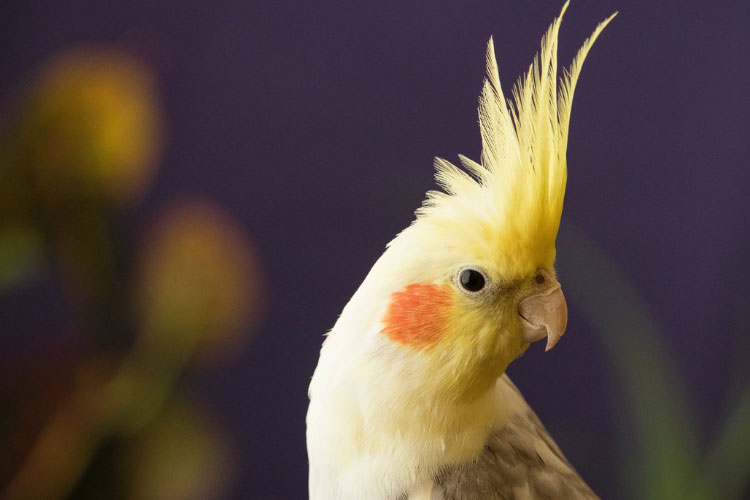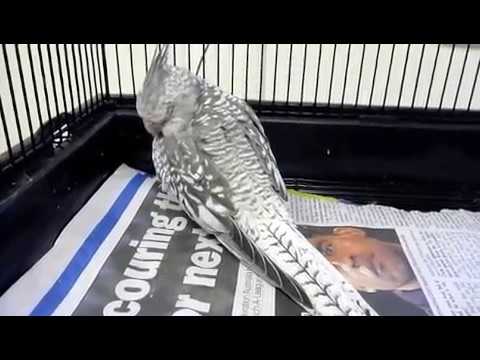As a cockatiel owner, you want your bird to be in good health. You may notice signs that indicate otherwise at times. Hence, you must prepare for these diseases, but how do you tell if your cockatiel is sick?
The first sign is a behavior change. If your cockatiel is sluggish and always sleeping, something is wrong. Examine its level of activity; is it active? Is it consuming food? Finally, observe the cockatiel’s vocalizations; a sick cockatiel will not sing and will chirp weakly. Check the cockatiel’s eyes, feathers, and nose as part of a physical examination.
Cockatiels are sensitive and clever beings. They may try to conceal their sickness so they are not to be appeared vulnerable to predators. Let us look at common sick cockatiel symptoms and treatment options.
How to Tell If a Cockatiel is Sick?
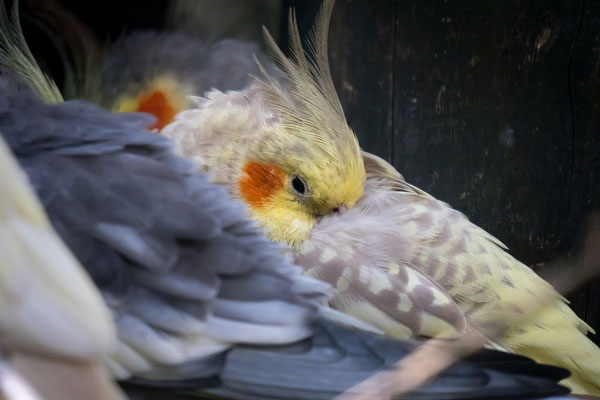
Here are ways to tell if your cockatiel is sick.
1. Note character alterations
Typically, cockatiels are very social and playful birds. To know whether your cockatiel is sick, you should know your cockatiel’s normal behavior. Why? Because birds typically do not exhibit disease symptoms until they are very unwell.
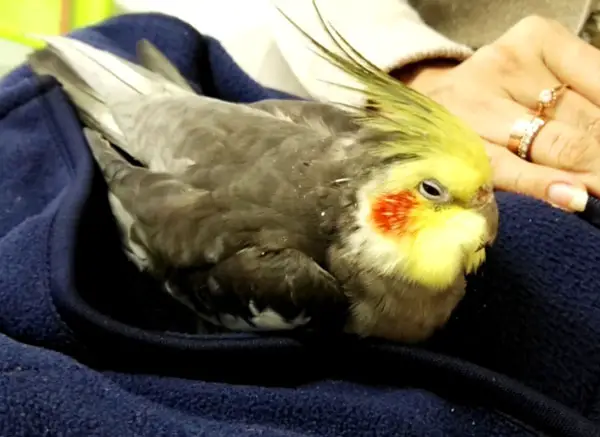
So, if you are observant, you will know when something changes. For instance, if your cockatiel no longer chirps when you enter the room, it may not feel well.
2. Is the cockatiel active?
If all of a sudden, the cockatiel is sluggish, that might be an indication something is wrong with it. Other signs of lethargy include;
- Sitting on a perch with ruffled feathers
- Sleeping on the cage’s bottom or sleeping in an unusual position
- Incapable of flying, perching, or exercising
- Sleeping the whole day
- No vocalizations if they are usually social; any changes in the sound or tone of their voice might suggest a problem
3. Is the cockatiel eating?
Changes in appetite are one of the primary indications of disease in cockatiels. If the bird loses appetite or is suddenly overeating, take it to a vet. Note that stress, anxiety, or a change in diet can also cause a cockatiel to lose its appetite. If the cockatiel is sick, you will observe other symptoms as well.
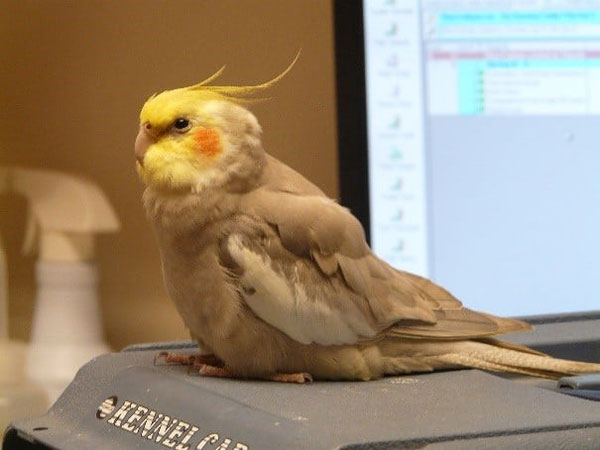
Apart from food, monitor their fluid intake. A sick cockatiel will consume more water to replace the one lost during vomiting or diarrhea. However, to know that it is sickness disturbing your cockatiel, rule out the following;
- Is the food too salty?
- Is the room too warm?
- Is the cockatiel regurgitating its chick?
- Does the cockatiel exercise a lot?
4. Cockatiel droppings
A bird’s droppings are the first to indicate if the bird is sick. It might seem disgusting to examine the cockatiel’s poop, but it is worth it. The color, texture, and amount of the droppings should clearly show whether your cockatiel is unwell. So, if you notice watery or too solid droppings, take the cockatiel to a vet.
5. Perform a physical examination
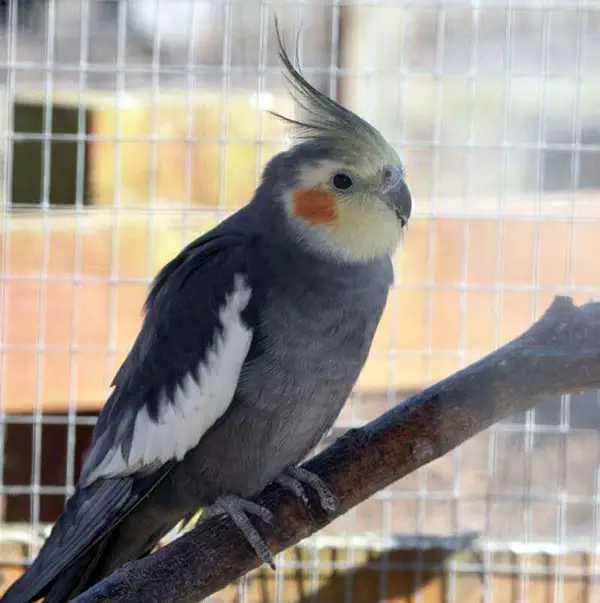
- Look at the cockatiel’s feathers. They are sick if they look ruffled or the cockatiel loses feathers around their chest and eyes. The cockatiel might be plucking its feathers due to sickness hence the feather loss.
- Look for eye, nose, or beak discharge. These areas should always be dry and free of discharge. Also, any crookedness or swelling of the beak should be considered unusual.
- Is your cockatiel losing weight? Weight might be challenging to examine, but you can use a weighing tray to weigh the bird. A significant loss of weight indicates something is amiss. Weight loss could be associated with stress also, so look for other accompanying symptoms to be sure that the cockatiel is sick.
What are the Symptoms of a Sick Cockatiel?
Now that you know how to tell if a cockatiel is sick, here are the symptoms you should look out for;
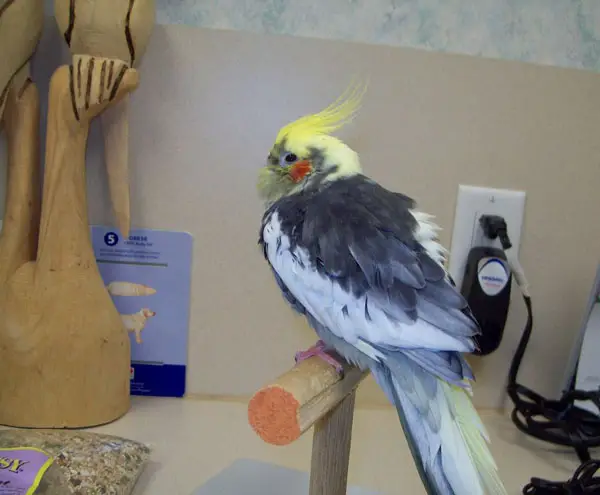
1. Respiratory problems
Infected or infested air sacs in a cockatiel can cause potentially fatal breathing issues. That is because infected air sacs may obstruct the respiratory pathways, which could cause asphyxia. Among the symptoms of respiratory problems are:
- Coughing
- Rapid, shallow respiration
- Wheezing, clicking, or gasping sounds
- The tail bobs with each breath
- Continuous open-mouthed respiration
Similarly, the most common cause of breathing difficulties in cockatiels is Teflon Toxicosis. When Teflon is heated over 280°C (536°F), particles and fumes are released into the atmosphere. If cockatiels inhale these fumes, they develop breathing problems. So keep your cockatiels out of the kitchen, particularly when cooking.
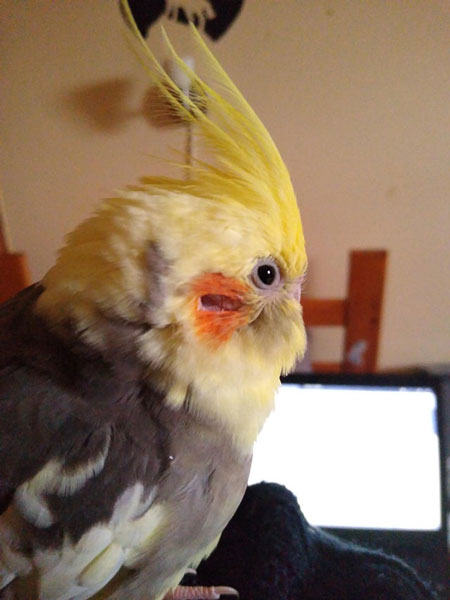
It could also be a respiratory disease or infection caused by bacteria, fungi, or viral. The symptoms of respiratory disease include;
- Difficulty in breathing
- Running nose
- Sneezing
- Shortness of breath
- Tail bobbing when breathing
The most common respiratory disease is Chlamydophilosis, psittacosis, or parrot fever. This condition can be detected with a blood or feces test. The following are the symptoms of parrot fever:
- Weight loss
- Lethargy
- Shivering
- Respiratory (breathing) disorders
- Diarrhea or loose, green droppings
- Eye and nose discharge
2. Digestive problems
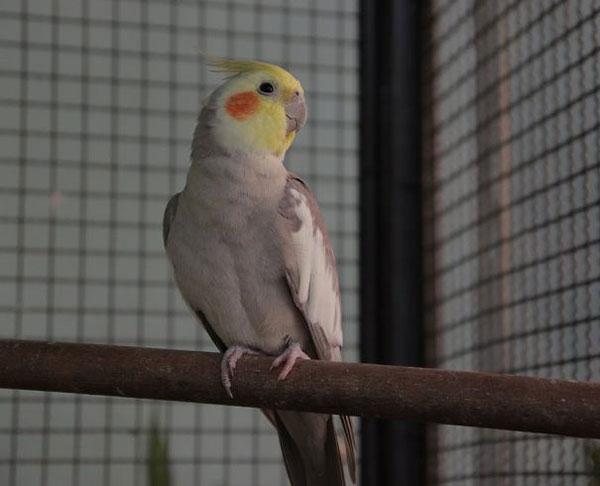
Most digestive issues in cockatiels are characterized by vomiting or diarrhea. Vomiting indicates one of the following conditions:
- Food poisoning
- Liver disorders
- Kidney or heart issues
- Virus or parasite disease
- Food allergies
- Overfeeding, an unbalanced diet, or vitamin shortages
3. Physical symptoms
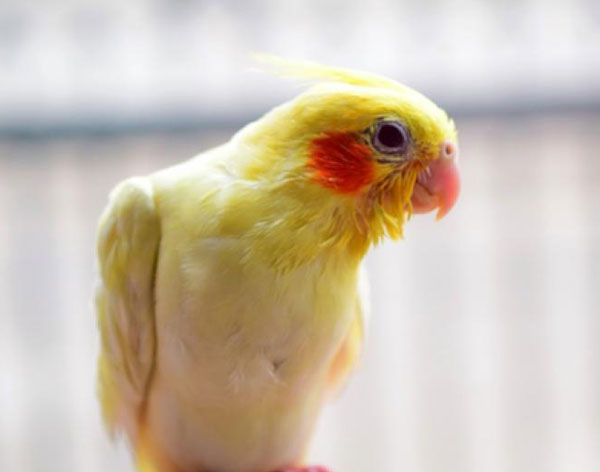
Here are some physical signs to look out for;
Unhealthy feathers
Ruffled feathers may indicate an underlying health problem that expresses itself in poor feather quality. Thus, ruffled feathers may also mask a bird’s weight loss, which can be fatal. So, please pay attention to extended periods of ruffled feathers.
In addition, a sick cockatiel may be unable to preen and keep its feathers. Diseases and infections can alter the color of a cockatiel’s feathers. When the cockatiel’s immune system is failing, bars or stripes form on the feathers.
Also, if you notice feathers around your cockatiel’s face appear unkempt, your cockatiel might be sick. Why? Because cockatiels are naturally clean birds that preen their feathers daily. Another indication is the loss of feathers. If the cockatiel has already undergone molting but is still losing feathers, this is a cause for concern.
Lethargy
When a cocktail that is generally active becomes overly quiet and withdrawn, something is wrong. You may notice the cockatiel oversleeping during the day, ignoring you when you enter the room, or refusing to eat. These may be indications of illness. You should be worried if your cockatiel is:
- Not vocalizing
- Quieter
- Not grooming or preening
- Sleeping at the cage’s bottom
- Falling off the perch
- Having difficulty breathing
Irritated eyes or cere
If you notice any discharge or redness from your cockatiel’s cere, your cockatiel is ill. Similarly, if your bird’s eyes appear hazy or have discharge, it may suffer from a respiratory or neurological disease.
Tail bobbing
The tail muscles of your cockatiel assist her in breathing by extending her lungs to accommodate more air. So, when experiencing breathing difficulties, cockatiels will constantly bob their tails up and down.
How to Take Care of a Sick Cockatiel
The first step is to take the cockatiels to an avian vet for a thorough examination. After the vet gives you a diagnosis, follow it to the letter and do the following to assist your sick bird.
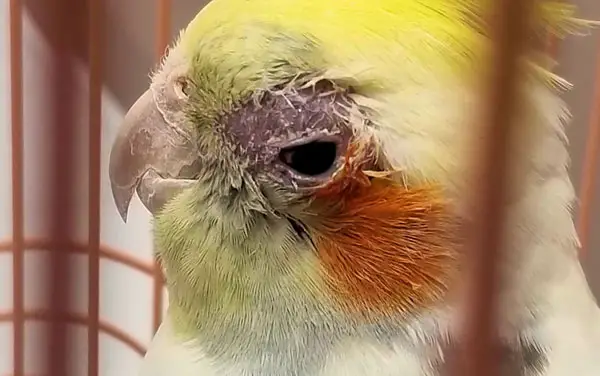
- Get a heater, heating lamps, or a heated perch. These two devices ensure that your bird is constantly warm, even in cold weather. However, turn off the heated perches before leaving the house.
- Keep your cockatiel’s cage away from windows that let in cold air. Instead, keep it in a warmer part of the house until the cold season is through.
- Make sure your bird gets enough food and water. A well-fed bird has a higher likelihood of recovering at a faster rate.
- Maintain a peaceful and noise-free environment. Your cockatiel will be less anxious as a result.
- Make sure other pets, such as dogs and cats, are not in the same area as your cockatiel.
- Spend time with your cockatiel to avoid stress caused by loneliness.
- Add toys or another cockatiel to your cockatiel’s cage to keep it entertained while you’re gone. These modifications will alleviate boredom.
- Keep your cockatiel in a clean cage and remove any leftovers. This will help to reduce the chances of the cockatiel getting bacterial infections.
Video of a Sick Cockatiel
Here is a video of what a sick cockatiel looks like.
FAQs
Here are other related questions.
Yes, you should, but only if you have other cockatiels. Avian veterinarians advise quarantining sick birds for up to 60 days of treatment.
If your veterinarian did not give you a diet for your sick cockatiel, ensure you feed the cockatiel with a well-formulated pellet diet. Also, provide the cockatiel with fresh water and small amounts of fruits to boost its body’s vitamin C levels.
Key Takeaways
Knowing your cockatiel is very important. This is because it will help you see when the cockatiel is sick. Take the bird to the vet immediately. That way, you can nurse the cockatiel back to health.
Moreover, provide the cockatiel with food, water, and a calm environment. Ensure you quarantine a sick cockatiel, so it does not spread diseases to other birds.
